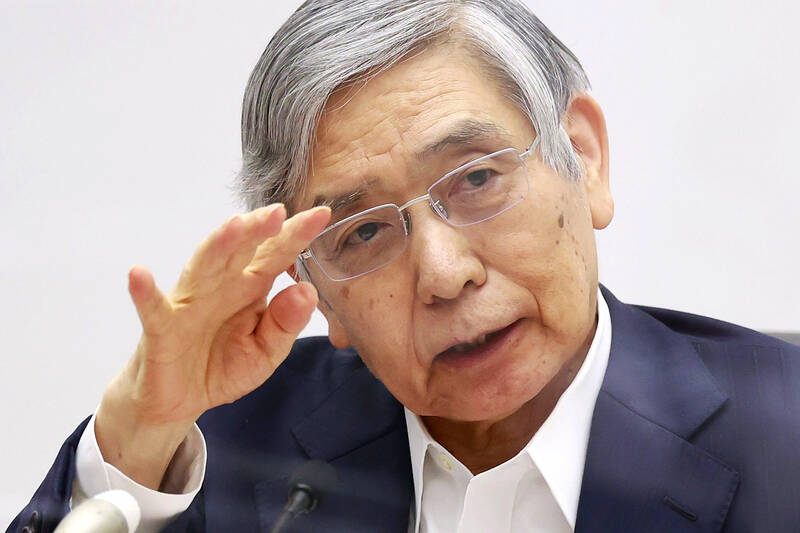Bank of Japan Governor Haruhiko Kuroda said that rapid yen moves are undesirable after a meeting with Japanese Prime Minister Fumio Kishida yesterday, joining a chorus of policymakers lobbing verbal warnings over the currency’s recent sharp drop to 24-year lows.
“Sharp currency moves are undesirable as they destabilize corporate business plans and heighten uncertainty,” Kuroda told reporters after the meeting, which he described as an occasional catch-up by the two sides to discuss broad economic and financial matters.
“When the yen is moving 2 to 3 yen per day, that’s a rapid move,” he added.

Photo: Bloomberg
The dollar jumped more than ¥2 on both Tuesday and Wednesday of this week, reaching ¥144.99 per US dollar — its highest since August 1998 — before stabilizing.
Kuroda’s remarks helped to knock the dollar to its biggest one-day drop against the yen in a month, although the US currency also retreated against other major currencies after a feverish climb in the dollar index to a 20-year high.
Japan’s currency is particularly vulnerable, while the Bank of Japan sticks to its policy of near-zero interest rates, focused on bolstering the economy while the central banks of other major developed economies hike rates to rein in inflation.
Verbal sabre-rattling is seen as one of the few viable near-term options for Japan to counter the yen’s marked weakness, which is boosting the cost of fuel and other vital imports.
“We will watch exchange rate moves carefully,” Kuroda told reporters after his meeting with Kishida.
While he discussed market developments including currency moves with the premier, he did not receive any specific policy requests, he said.
“By summoning Kuroda, the premier wanted to deliver a message that he is concerned about sharp yen falls,” said Makoto Noji, chief foreign exchange strategist at SMBC Nikko Securities.
“Both know all too well that the weak yen stemmed from broad dollar gains, which no one can resist,” he said. “While maintaining a fighting stance, Japan has no choice but to wait until the US tightening cycle comes to a halt, once it has cooled down the economy.”
The US dollar fell to ¥143.10 following Kuroda’s remarks, and extended that drop as far as ¥142.43. It was last down about 1 percent at ¥142.60.
“Kuroda’s remarks somewhat triggered the decline, which I suspect were likely caused by repositioning among retail foreign exchange investors and rebalancing of pension funds such as GPIF,” Noji added, referring to Japan’s Government Pension Investment Fund.
Prior to Kuroda’s remarks, Japanese Finance Minister Shunichi Suzuki on Friday said that the government would not rule out any options on foreign exchange moves, repeating a warning on Thursday by Japanese Vice Minister of Finance for International Masato Kanda, the country’s top currency diplomat.
“We’ve seen a rapid heightening of market volatility against the background of speculative moves,” Suzuki told reporters, adding that authorities were “very concerned.”

Taiwan will prioritize the development of silicon photonics by taking advantage of its strength in the semiconductor industry to build another shield to protect the local economy, National Development Council (NDC) Minister Paul Liu (劉鏡清) said yesterday. Speaking at a meeting of the legislature’s Economics Committee, Liu said Taiwan already has the artificial intelligence (AI) industry as a shield, after the semiconductor industry, to safeguard the country, and is looking at new unique fields to build more economic shields. While Taiwan will further strengthen its existing shields, over the longer term, the country is determined to focus on such potential segments as

UNCERTAINTY: Innolux activated a stringent supply chain management mechanism, as it did during the COVID-19 pandemic, to ensure optimal inventory levels for customers Flat-panel display makers AUO Corp (友達) and Innolux Corp (群創) yesterday said that about 12 to 20 percent of their display business is at risk of potential US tariffs and that they would relocate production or shipment destinations to mitigate the levies’ effects. US tariffs would have a direct impact of US$200 million on AUO’s revenue, company chairman Paul Peng (彭雙浪) told reporters on the sidelines of the Touch Taiwan trade show in Taipei yesterday. That would make up about 12 percent of the company’s overall revenue. To cope with the tariff uncertainty, AUO plans to allocate its production to manufacturing facilities in

COLLABORATION: Given Taiwan’s key position in global supply chains, the US firm is discussing strategies with local partners and clients to deal with global uncertainties Advanced Micro Devices Inc (AMD) yesterday said it is meeting with local ecosystem partners, including Taiwan Semiconductor Manufacturing Co (TSMC, 台積電), to discuss strategies, including long-term manufacturing, to navigate uncertainties such as US tariffs, as Taiwan occupies an important position in global supply chains. AMD chief executive officer Lisa Su (蘇姿丰) told reporters that Taiwan is an important part of the chip designer’s ecosystem and she is discussing with partners and customers in Taiwan to forge strong collaborations on different areas during this critical period. AMD has just become the first artificial-intelligence (AI) server chip customer of TSMC to utilize its advanced

Chizuko Kimura has become the first female sushi chef in the world to win a Michelin star, fulfilling a promise she made to her dying husband to continue his legacy. The 54-year-old Japanese chef regained the Michelin star her late husband, Shunei Kimura, won three years ago for their Sushi Shunei restaurant in Paris. For Shunei Kimura, the star was a dream come true. However, the joy was short-lived. He died from cancer just three months later in June 2022. He was 65. The following year, the restaurant in the heart of Montmartre lost its star rating. Chizuko Kimura insisted that the new star is still down